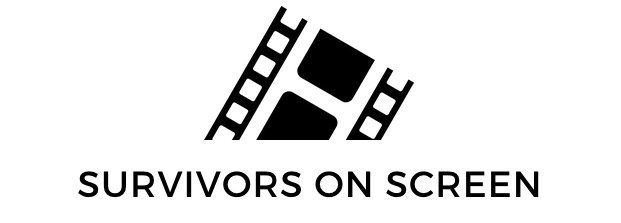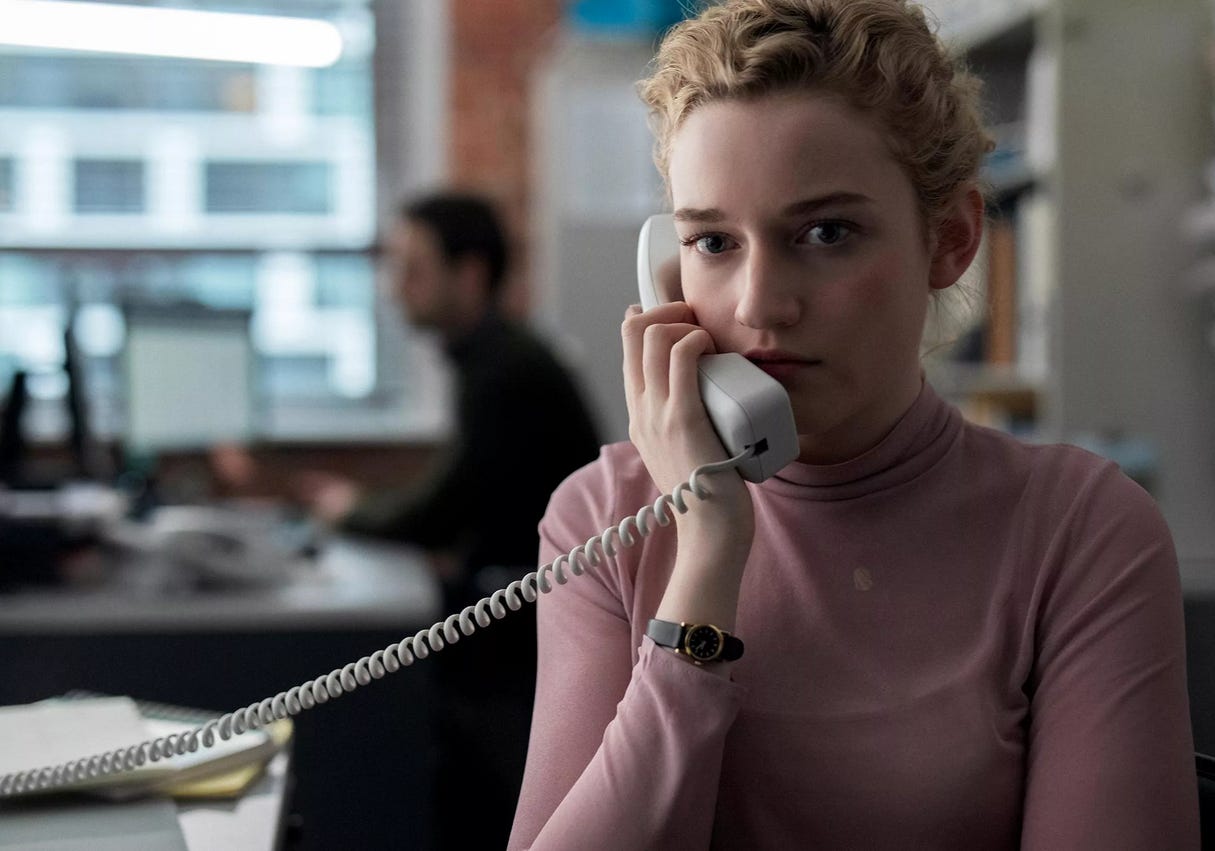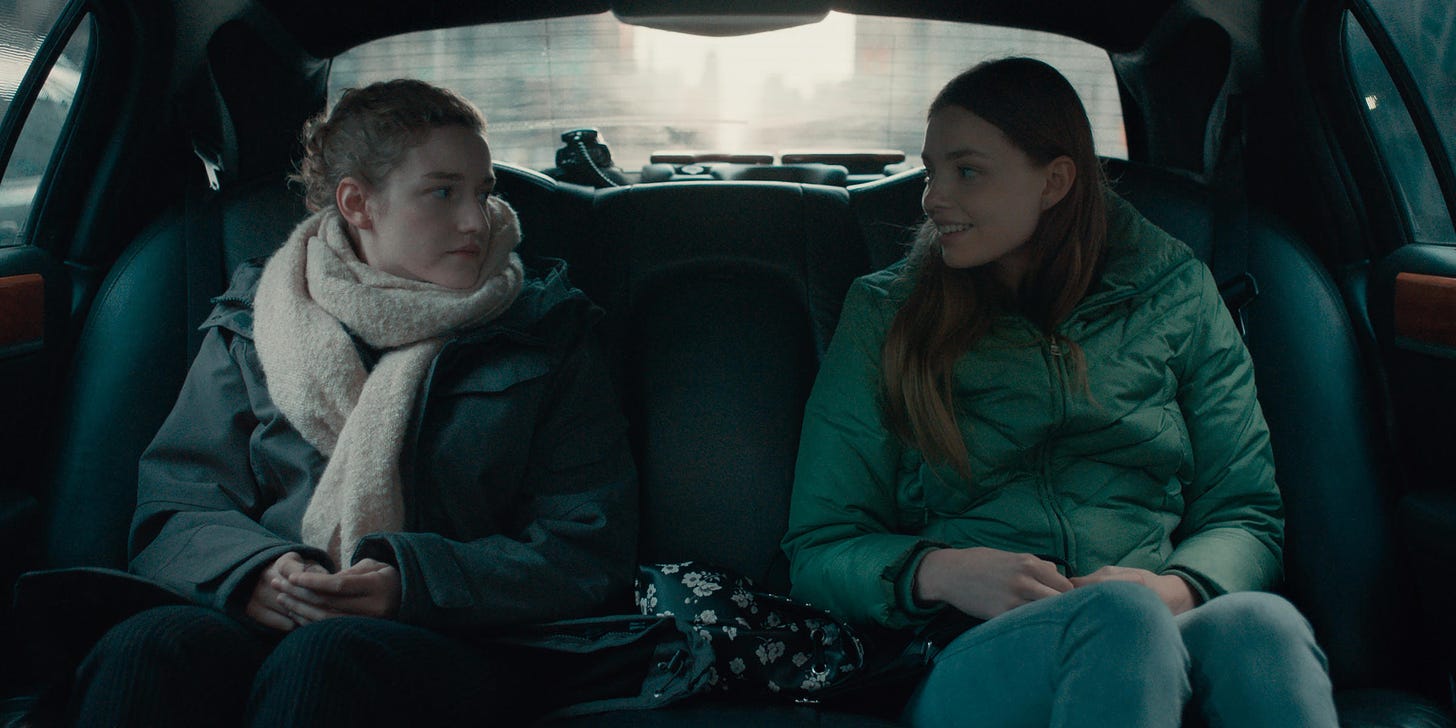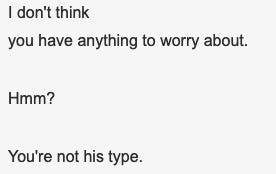Thank you for reading Beyond Survival, a publication about life after trauma. This is the third installment in my Surivivors on Screen series about how sexual violence is portrayed in TV and film. Please be aware that some readers might find it triggering and that there are spoilers ahead. Here are the earlier posts in this series: the introduction, ‘Promising Young Woman’, ‘Unbelievable’.
If you find value in my work, please consider upgrading to a paid subscription. I want this space to be accesible to the people who need it and have decided (at least for now) not to use a paywall. If you have the means to support me financially, I really appreciate it. You make this work possible.
“I don’t think you’ve anything to worry about…You’re not his type”
Released in 2019, The Assistant is a 90-minute drama written, directed, produced and edited by Kitty Green. It stars doe-eyed Julia Garner as Jane, a recent college grad and aspiring producer who’s landed her dream job working as an assistant to a powerful film executive. Harvey Weinstein is never mentioned, but his abusive behaviour is the lens through which most audiences will consume this film.
The film depicts a single day in the office, entirely from Jane’s point of view. We see her methodically cycle through the menial yet important tasks she’s responsible for - making coffee, printing scripts, organising the grinning headshots of young actresses, making travel arrangements and ordering lunch. The mundanity of her work is the backdrop for a kind of slow-moving horror as she figures out what’s really going on.
The evidence accrues slowly. She cleans a room her boss and a young woman have just left, scrubbing a stain from the couch and emptying a bin which includes several syringes of alprostadil (an erectile dysfunction treatment). She finds a stray earring on the floor and puts it aside to give to the terrified young woman who later stops by to collect it. She prepares blank cheques for her boss to sign, and accompanies a second young woman to a fancy hotel where an expensive room has been booked for her.
I was particularly struck by how this film sounds. “The cultural silence is something we were exploring,” Green said, adding, “That quiet was really important to me.” Against a palate of gray, corporate impersonality, the sounds of the office are heightened: the hum of the fluorescent kitchen lights, the whirr of the photocopier, the gurgle of the water cooler.
Jane works amidst a warren of cubicles, where she is constantly surveilled by her male colleagues. She is desperate for her mercurial boss’s approval and in the course of a single day, writes two apology emails. The bobbing heads of her male colleagues dictate as she types: “I will not let you down again”.
“I’m tough on you because I’m gonna make you great,” her boss replies, in a textbook depiction of abusive power dynamics.
Ultimately, Jane decides to speak to HR. She sits opposite Wilcock (a smarmy Matthew MacFadyen), the head of the HR department who takes notes on a yellow legal pad and encourages her to talk.
Here’s a taster:
It’s a brilliantly executed scene, from Wilcock’s slimy faux-concern to his deft gaslighting. He implies that she’s jealous of the young woman being abused, that she's making a problem out of nothing, that she’s about to destroy her career. The New York Times describes the scene as being hit with “velvet-covered shrapnel”.
What struck me most was his parting shot:
“You’re not his type”
I’ve heard that line before. A former colleague I’ll call Dan said it to me after I received a credible accusation of sexual misconduct against my then-boss. I wasn’t surprised exactly, but I was stunned. I instantly believed the woman. What she described sounded exactly like something that boss would do. By the end of the day, a half dozen more incidents had surfaced.
I think about that woman those women often, and how I could have handled that situation better. It likely wouldn’t have made any difference, but it haunts me still. Both the first accuser and I left the organisation soon afterwards. I couldn’t work for a man like that anymore. I’ll never forget the meeting where he tried to persuade me that she was lying. The look of disgust on my face hopefully made clear that I didn’t believe him. He ended the meeting abruptly and I went home at the end of the day, shaking and enraged.
It’s hard to know how to characterise the way Dan said “you’re not his type” to me. Was it reassurance? A joke? Did it mean that I was safe with the accused, but perhaps not with someone else? Someone who would have considered me “his type”? Of course, it should go without saying that sexual harassment is about power. A person’s perceived attractiveness has nothing to do with it. Whether or not I was “his type” is completely irrelevant. Dan’s comment was complicated by the fact that I considered him to be a friend. He was a straight-talking mentor-type whom I genuinely liked and admired. Then I learned that he didn’t care about my safety. Or, more likely, that sexual misconduct in the workplace was more of a joke to him than a genuine threat. He thought it was edgy office gossip, not a crime.
I enjoyed this film. It’s smartly conceived and well-made and it’s exactly the kind of film that Hollywood favours. A story about a single bad man surrounded by a circle of enablers. It’s a story with a clear and recognisable villain who, we can imagine, spits when he talks and is routinely horrible to women and girls. It captures one kind of abuse, the kind that sparked the 2017 viral #MeToo movement when mostly wealthy, thin, able-bodied and cis white women spoke about their experiences of sexual violence in the workplace.
By comparison, there has been almost no attention given to survivors of sexual violence perpetrated by family members or other people known to them, which is statistically much more common. My primary critique of films like The Assistant is that they are too small, too narrow, too tidy.
Imagine that instead of a young woman in her 20s, this film focused on a young child subjected to sexual violence or coming to terms with the fact that someone else close to them is being abused. Or imagine a film about a new mother coming to terms with the fact that her partner (of whatever gender) has been sexually assaulting her in her sleep. Her body has been split open by childbirth, and in a time of extreme vulnerability, she is being assaulted, routinely, in her own bed.
Would audiences be able to handle those stories? Would Hollywood be willing to make them? They certainly wouldn’t get as much attention as stories about celebrities do.
There are other challenges associated with making films like those. For a start, there are ethical considerations around casting a child actor in the role I’ve described. Filmmakers can find creative ways to shoot those scenes. I’m thinking in particular of Jennifer Fox’s “The Tale” which is about a young girl being abused by her sports coach. The film includes several scenes of graphic abuse, which were shot without the child actor having to be in the same room as the actor playing the perpetrator.
But would audiences be willing to watch these kinds of stories about sexual violence? As a culture, there are horrors we are willing to face and others that we prefer to ignore. And while we’re busy pretending these things don’t happen, children and other vulnerable people are suffering. Films can’t prevent sexual harm from happening, but they can contribute to a more informed cultural conversation which allows us to better protect and support each other. Sexual violence thrives in silence. The more we talk about it, the more we’re able to prevent it and support those who’ve been harmed to recover.
Director Kitty Green purposefully decided to centre her story on the person with the least power, “someone you almost ignore”. In this sense, her film is quietly ground-breaking. But audiences need more. The representation of sexual violence on screen shouldn’t be limited to the ways pretty, white women are mistreated. We need to be willing to expand the lens enough to take in the full breadth of our collective experiences of sexual violence.
I enjoyed The Assistant. I’m glad it exists and recommend it. If you’ve ever had a shitty office job, where you were encouraged to be a “team player” no matter the cost, this film will feel creepily familiar. Rewatching it, I remembered why I had to leave those environments and why I hope never to return.
Bibliography:
The Haunting Sound Design of The Assistant (YouTube video)
The Assistant is a movie about more than Harvey Weinstein. It’s about the system around him. (Vox)
The Assistant isn’t about Harvey Weinstein. It’s about the culture that enabled him. (Washington Post)
💕 If this piece resonated with you, please tap the heart below to help spread the word.
If you care about Beyond Survival’s mission, please consider sharing it with a friend.
✍️ Beyond Survival is written by me, Clare Egan, an award-winning writer and journalist. You can read more about me here, or look at some pretty pictures over here. 👋 Click reply to say hello anytime. Thank you for being here!









I’ve just discovered your blog, and as a fellow CSA survivor, it’s so validating. I can’t watch any media that has sexual violence as a plot or subplot, but your analysis is so insightful. I’ve had my own experiences with the whisper network. It’s no defence at all against powerful harassers. And capitalism has its own goads that mean even if one is a target of/unwilling accomplice in said circle, maybe you stay on, because what choices do you have really? If you quit a job before ´something’ happens, how much support is guaranteed to you, even from one’s family? There are so many insidious factors and it makes me mad when people say she/they should just have quit.
beautiful piece Clare on a hauntingly important subject. I like that it centres around the character you most often ignore. i'll give it a watch. thank you for your insights on it and relating stories to it. I too have had to deal with incidents similar to yours in the academic work world I left many years ago.